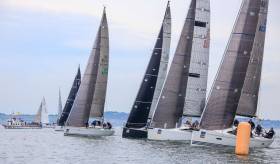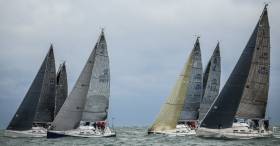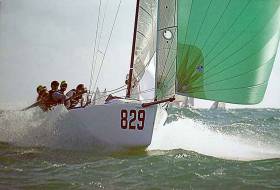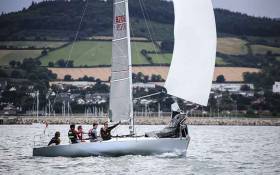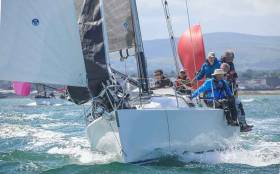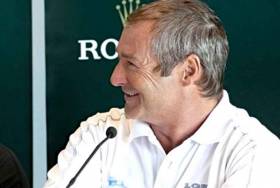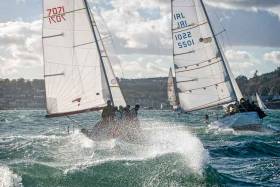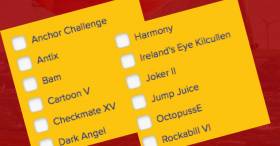Displaying items by tag: ICRA
Crew number limits or crew weight limits at this year's ICRA National Championships are under review following discussion at last weekend's ICRA Conference in Limerick where it was shown different regattas deal with crew weight limits in different ways.
The focus of conversation, under guest speaker Mike Urwin of the RORC, was the disposal of crew limits at events such as the ICRA National Championships.
The 2017 ICRA Notice of Race states 'IRC Rule 22.4 will be deleted'. This rule says: “The Crew Number printed on each boat’s certificate shall not be exceeded or the crew weight shall not exceed 85kg multiplied by the Crew Number printed on the certificate.”
As the rule does not apply at the ICRAs, boats have an option to take less crew on a light wind day and stack the rail in breeze.
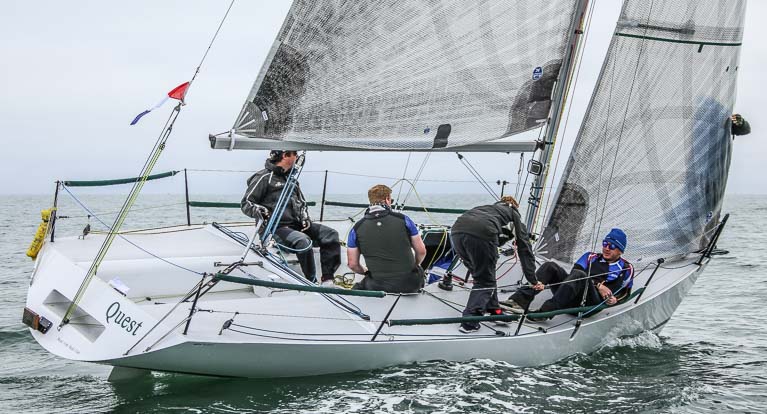 The Quarter tonner Quest in light air mode for the 2016 ICRA Championships at Howth. Photo: Afloat.ie
The Quarter tonner Quest in light air mode for the 2016 ICRA Championships at Howth. Photo: Afloat.ie
Traditionally, fun regattas like Calves Week, did not have crew limits, so that late crew members could be recruited from the quayside and children could also be accommodated as required.
The move to delete the limit rule followed significant consultation with sailors and ICRA surveys found overwhelming support for its withdrawal.
However, the meeting heard that for 'serious regattas', such as a national championships, not having a crew limit can lead to advantages to those who bring a large crew pool to an event, thus upping overall costs of participation.
Some delegates believed championships should stick to the IRC certificate crew limit or maybe the 'cert plus one'. Others thought a stipulation in the Sailing Instructions requiring the same crew numbers in every race would be helpful.
The ICRA Executive is to review the comments made on the day, and a decision on the situation for the Royal Cork championships in June will be made 'sooner than later', ICRA Commodore Simon McGibney told Afloat.ie.
'ICRA have taken on board comments and will review the discussions before any final decision is made'
Should there be crew limits? Have your say in our reader poll below. POLL EXPIRED.
Should Dublin Bay Sailing Club Cruisers Zero & One Merge?
With just over six weeks to the Sherry Fitzgerald sponsored Dublin Bay Sailing Club season the stand–out class of the year looks like Cruisers One where a 20–boat fleet has 13 J/109s among its number. It's an impressive result that bodes well for a very competitive season but in the neighbouring big boat class should something be done to assist falling numbers in Cruisers Zero?
A story this week on Afloat.ie shows George Sisk's Wow from the Royal Irish Yacht Club is on the market. With only four other entries presently in DBSC Cruisers Zero is it now time to dispense with a Cruisers Zero class on Dublin Bay and rearrange the bands to take some lower–rated Cruisers One boats back into Cruisers Two?
Such a scenario is unlikely with the news that Sisk's WOW will be campaigned fully this season and a new Sisk forty footer is in the wings. In fact, there is also the possibility that Cruisers Zero could reach six boats this season with another new boat – yet to be announced – coming into the Bay.
There is also talk of DBSC moving the Cruisers One band lower to move some Cruisers One boats into Cruisers Zero but is that the answer?
Cruisers Zero was never that particularly strong in Dublin Bay and generally came about to ensure they got decent length races as the Cruisers One boats were considerably slower. However with the ever increasing speed of Cruisers One boats the gap in elapsed time between Cruisers Zero and Cruisers One has been reducing considerably.
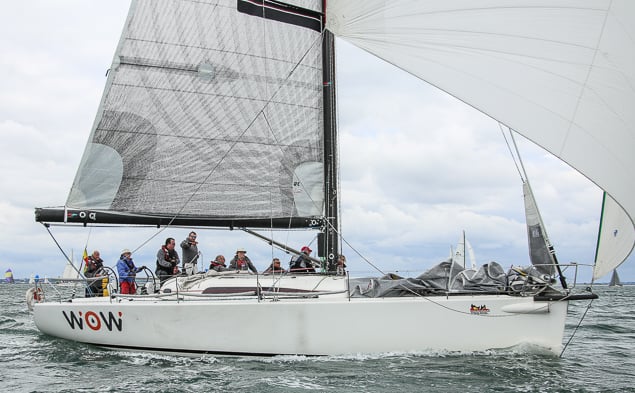 Cruisers Zero Farr 42 Wow is for sale but will be replaced with a similar sized boat Photo: Afloat.ie
Cruisers Zero Farr 42 Wow is for sale but will be replaced with a similar sized boat Photo: Afloat.ie
Cruisers One, spearheaded by the J109 designs, is clearly the strongest class in DBSC and likely in the country. Since the J109 class moved to non–overlapping jibs and consistently updated their sail wardrobes with the latest in sail technologies, they have been getting quicker and quicker.
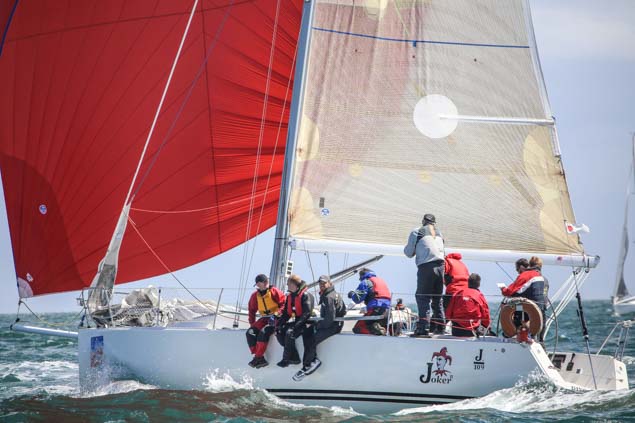 ICRA Boat of the Year, Joker 2, a J109 from the Royal Irish Yacht Club. Photo: Afloat.ie
ICRA Boat of the Year, Joker 2, a J109 from the Royal Irish Yacht Club. Photo: Afloat.ie
Three of the last four ICRA championships in Cruisers One have been won by J109’s including the last two years (Joker II) and the 2016 ICRA Boat of the Year is also a J109 (Joker II). A J109 also was a class winner in the Round Ireland race 2016 (Storm). The J109 class has pushed others in Cruisers One to up their game and now we see both the Archambault 35s Gringo and Adrenalin becoming much more competitive, along with the XP33 Bon Exemple that has gone through many changes over the last few year (symmetric to Asymmetric and back again, lowering their rating). Add to this Paul O'Higgins mighty Rockabill VI, the JPK 10.80, and Cruisers One is the strongest it has ever been.
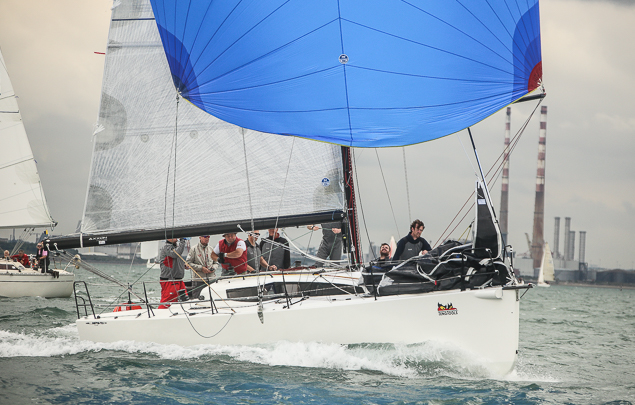 Paul O'Higgins mighty Rockabill VI, the JPK 10.80 design will be unstoppable in heavy airs. Photo: Afloat.ie
Paul O'Higgins mighty Rockabill VI, the JPK 10.80 design will be unstoppable in heavy airs. Photo: Afloat.ie
At the start of last season Tim Goodbody brought in the J109 White Mischief and two further J109’s have entered the fleet in the last six months, Andrew Algeo's Juggerknot and Andrew Craig's Chimeara. All three are seasoned campaigners and will surely drive the fleet further.
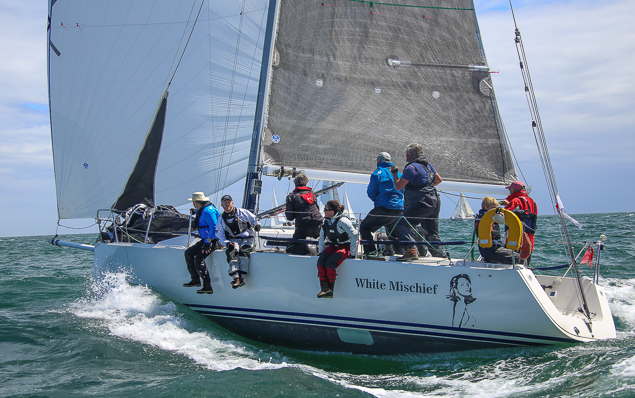 Recent arrival – Tim Goodbody's White Mischief J109 was immediately competitive Photo: Afloat.ie
Recent arrival – Tim Goodbody's White Mischief J109 was immediately competitive Photo: Afloat.ie
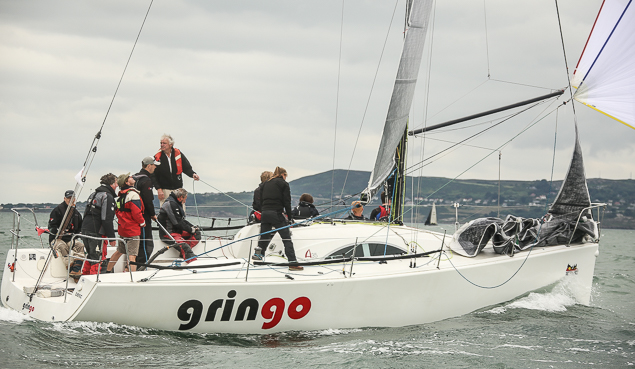 The A35 Gringo has a flatter stern and quick dead downwind. Photo: Afloat.ie
The A35 Gringo has a flatter stern and quick dead downwind. Photo: Afloat.ie
So who will be on the DBSC podiums this year in Cruisers One and also Cruisers One at ICRAs? With 13 J109’s competing surely the podium will be stacked with these 15–year–old designs? They are extremely competitive in lighter airs and can hold their own when the breeze gets up. Their only weakness is running in stronger winds where the lighter, and flatter sterned modern designs, like the A 35’s and XP 33’s can pull their poles back and go straight downwind, whereas the asymmetric J109’s have to do higher angles.
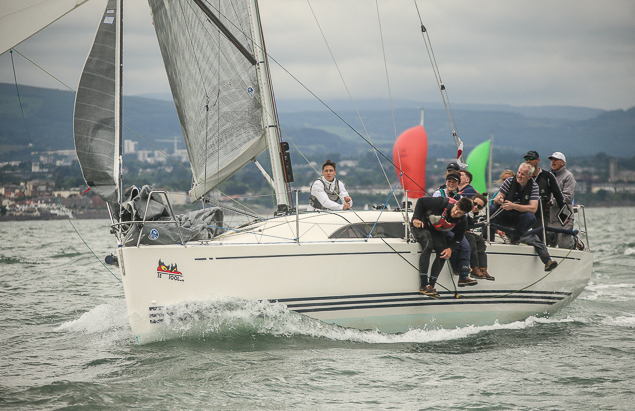 XP33 Bon Exemple – different spinnaker configurations. Photo: Afloat.ie
XP33 Bon Exemple – different spinnaker configurations. Photo: Afloat.ie
If, however, the winds stay stronger for a whole series, like ICRA's 2015, it will be very hard to beat Rockabill VI. This boat is extremely powerful and will go upwind and downwind much faster than the rest of the fleet in a breeze, even taking into account her higher handicap. However it appears she has a weakness in light airs and one day of these conditions in a series might be a problem for her.
Three in a Row for Joker II at ICRAs?
Among the J109’s the top performer from 2016, John Maybury's Joker 2 is going for three in a row at ICRA's having won in 2015 and 2016. She will not have it all her own way however as Tim Goodbody's White Mischief and Pat Kelly's Storm are always very competitive. The newly arrived Chimeara and Juggerknot might also have something to say. The A35 Gringo has shown a lot of form as has Bon Exemple. At ICRAs you will also likely be seeing the A35 Fools Gold of Rob O'Connell in contention as he has done in the last two events.
Packed Season
2017 is set to be a very interesting year for this ever strengthening class with 3 large events in Ireland for them to battle it out. The ICRA Championships in Cork Harbour in June, ten days later, Sovereigns Cup in Kinsale, and a few weeks after that Dun Laoghaire Regatta Some may also venture to Tarbert in Late May, Calves Week in Early August and Abersoch week in Late August. There are plenty of good events available and some great racing ahead. Allied to all of this a great regular racing scene in Cruisers One in the DBSC series.
Afloat.ie’s W M Nixon may have received the Royal Irish YC’s “Maritime Journalist of the Year” Award on Saturday night for his “ability to make even the most advanced and complex sailing issues understandable and of interest not only to ordinary sailors, but to non-sailors too”, but he reckons the blog for this coming weekend will pose one of his biggest challenges ever, as he will be trying to explain what goes on in the annual Irish Cruiser Racing Association Conference.
Having attended last Saturday’s capacity gathering in Limerick, it was clear that while in some localities and some areas of interest, sailing appears to be in decline, the popularity of national Irish Cruiser-Racer Conferences is greater than ever.
And as for the irresistible attraction of an historic and distinguished yacht club handing out its Oscars……well, the RIYC could teach Hollywood a thing or two. Despite a packed-out dining room, it was all smoothly done after a very fine and convivial dinner with efficiency and humour, combined with a palpable sense of community. Nixon promises us he’ll try to do justice to it and ICRA on Saturday, but admits that having apparently spent the weekend zapping back and forth across Ireland, he is still waiting for his soul to catch up with his body.
Additonal reporting from ICRA: Declining fleets and youth engagement nationwide led to a wide-ranging discussion that started the annual Irish Cruiser Racing Association (ICRA) conference in Limerick.
More than 70 sailors from all corners of Ireland were in attendance to hear proposed solutions from the ICRA leadership that received an enthusiastic reception.
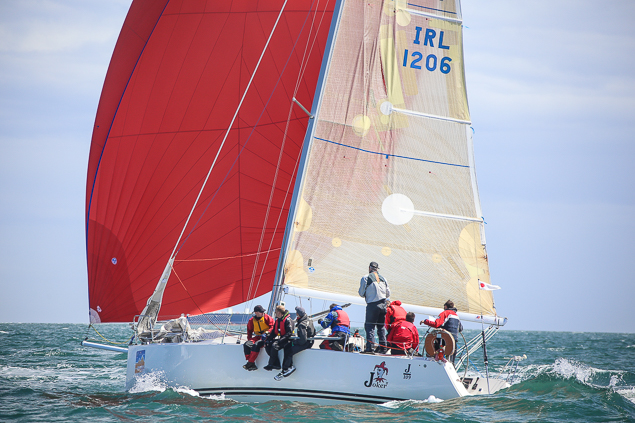 J109 Joker II. Photo: Afloat.ie
J109 Joker II. Photo: Afloat.ie
John Maybury’s J109 Joker 2 from the Royal Irish Yacht Club in Dun Laoghaire was announced as the ICRA Boat of the Year following a successful 2016 season that included the IRC national championship title and victory for the Irish Defence Forces team in the Beaufort Cup as part of Volvo Cork Week.
Addressing the twin problems of falling fleet numbers and poor youth participation, ICRA’s Denis Kiely led a broad discussion that found similar stories from clubs and organisers around the coast.
In spite of the problems being experienced by the majority of clubs, ICRA is actively delivering solutions aimed at helping some of the issues. Several programmes were outlined at the conference including:
Crew Point – a physical and online scheme to link sailors and boats;
Cruiser Training Grant – applicants can receive €1,000 supporting grant;
Training Curriculum for Cruiser Racing – in development.
There were also calls for more investment, particularly in club fleets of small keelboats, professional coaching and recruitment, better collaboration between neighbouring clubs and a clearer pathway into keelboats for dinghy sailors and varsity teams.
“We’ve got to get our act together, we’ve got huge potential!” commented former ICRA Commodore Norbert Reilly. Clubs should be in contact with local schools and improve collaboration to get more people into the sport.
In other modules at the ICRA Conference, Paul Tingle of the Royal Cork YC outlined plans for the annual ICRA National Championships to be held over three days at Crosshaven from 9th of 11th June 2017. Free berthing, coastal courses, space for camper vans and assistance to deliver boats to Kinsale for the Sovereigns Regatta are among many features for the championships.
Royal Irish Yacht Joker II is Named ICRA Boat of the Year
John Maybury's Joker II was named 'Boat of the Year' this afternoon at the ICRA Conference in Limerick.
The judges followed the lead given to them by Afloat.ie readers this week in an online poll where Joker II featured prominently.
Announcing the winner from a shortlist of 12 boats, previewed by Afloat.ie here, the Dublin J109 that competes in both offshore and inshore disciplines was marked out for its consistent performance at the ICRA National Championships in Howth.
Maybury, of the Royal Irish Yacht Club, recorded a back-to-back win in the ICRA Nats – the only boat to do so in 2015–2016 – and under the skippering of Commandant Barry Byrne, she was the first winner of the new inter-forces Beaufort Cup including winning its Fastnet Race. Same boat, but completely different crews – Joker 2 made a special claim for top boat of the year.
 The J109 Joker II will be seeking three titles in a row at this year's ICRA National Championships in June. Photo: Aflloat.ie
The J109 Joker II will be seeking three titles in a row at this year's ICRA National Championships in June. Photo: Aflloat.ie
Maybury's crew, it has been revealed, are aiming for three in a row at this year's National Championships at Royal Cork Yacht Club in June.
The trophy was accepted this afternoon by one of Maybury's crew, Mark Mansfield, the four time Olympian from Royal Cork Yacht Club.
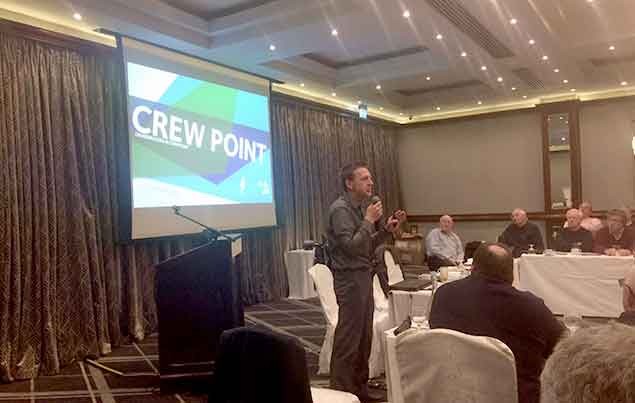 ICRA Commodore Simon McGibney addresses 70 delegates at today's ICRA conference in Limerick
ICRA Commodore Simon McGibney addresses 70 delegates at today's ICRA conference in Limerick
Smaller Boats Not Welcome at IRC Euros 2018?
The significance of the RORC decision to merge the Commodore's Cup with the IRC Europeans in 2018 has extra meaning for Ireland given at least half of the Irish fleet will not be eligible to race due to a ratings band change.
RORC has set a lower rating limit of 1.000 so that means, for example, first and second overall at the 2016 Europeans (Irish boats, Anchor Challenge and Harmony) will not be able to compete in 2018.
It is a vastly different situation to that which existed for the inaugural Euros at Cork Week 2016 and also this year's event in Marseilles. The 2017 event has a minimum limit of .900 allowing them this year.
Details of the 2018 event were published by Afloat.ie yesterday here.
Ireland's fleet has a lot of sub 1.000 boats, but particularly the growing Quarter and Half Ton classes.
Two of the strongest classes at the ICRA championships are class 2 and class 3 and effectively IRC organisers (UNCL and RORC) are not giving them a place at their own European championships.
No doubt this is something that will be addressed tomorrow at the ICRA conference in Limerick where RORC will be in attendance and can give an explanation.
'It appears RORC are trying to resurrect the dying Commodores Cup by attaching it to the IRC Europeans, and in so doing is telling smaller, often less wealthy owners, that they are now not interested in them, a leading Irish IRC racer told Afloat.ie'.
A change to a lower limit that at least includes the Half tonners would be to Ireland's advantage.
There will be plenty of items for discussion when ICRA Commodore Simon McGibney opens up a 'round table' discussion on his advertised theme of 'we have to talk about cruiser racing' at the ICRA conference in Limerick tomorrow.
A move towards more coastal racing at Dublin Bay Sailing Club as well as the axing of its Cruiser Challenge event reflect changing trends on Dublin Bay.
Water Rat has the 'temerity' to raise the question of the overcrowded keelboat fixture list as cruiser–racer fans prepare for five major events between June 9 and July 9.
Former Howth Commodore Brian Turvey argues that ICRA must take on the role of a national handicapping authority if ECHO and IRC systems are to remain relevant and win over ‘What’s The Pointers’. IRC is something ex-pat helmsman Gordon Maguire discussed recently in the Australian Sailing media too.
News from RORC that a 100–strong fleet will contest the 2018 in Euros in Cowes along with the Commodore's Cup gives Ireland a new opportunity to contest an event first sailed at Cork Week last year but wih new rating bands in place for 2018, what Irish small boats are eligible?
Afloat's informal readers poll for the ICRA Boat of the Year award shows Dublin J109 Joker II and Half tonner Harmony neck and neck after over 2,200 votes cast but of course the judges may decide otherwise from the 12–boat shortlist. 4.30pm tomorrow in Limerick will reveal all.
The conference starts tomorrow at 10.30 at the Castletroy Hotel in Limerick.
ICRA Debate: Can Cruiser National Championships Afford To Be Stand Alone Event in Crowded Sailing Calendar?
The Irish Cruiser Racer Association must be applauded for providing a platform under the theme: 'we need to talk about cruiser racing' at tomorrow's conference in Limerick. Like an elephant in–the–room, the overcrowded Summer fixtures needs to be urgently addressed because it's not only the hosting clubs and competitors that suffer but the sport itself.
Between June 9 and July 9 Irish cruiser–racers have – in date order – the ICRA Nationals in Royal Cork YC (June 9–11), Sovereigns Cup at Kinsale Yacht Club, (June 21-24) Dun Laoghaire Regatta on Dublin Bay from (July 6-9) and Galway's WIORA on the Aran Islands from July 5–8.
On top of this, the biennial Dun Laoghaire to Dingle offshore race sets sail from the National Yacht Club for a three–day race on June 14.
These major events are icons of Summer sailing but how much do we lose by having them all within one month?
With a total available racing fleet of say up to 150 keelboats in Ireland, very few boats will do all five events, not least because WIORA and Dun Laoghaire regatta dates clash.
For many skippers, getting enough crew to do even two of these events will be an achievement in itself.
And, in what is becoming a well identified problem at club level, the successive nature of these events will certainly have a knock–on effect in crew availability for local racing.
Already Dublin Bay Sailing Club has taken a pragmatic approach and scrubbed its own long standing DBSC Cruiser Challenge because of this congestion.
It may seem blindingly obvious but it needs to be said, the Irish keelboat sailing calendar has just too many events for the times that are in it.
Does such congestion best showcase our sport? Attract sponsors or discourage them? And most importantly does it suit the sailors?
It's not the first time Water Rat has mentioned it. He raised it back in 2013 when one senior organiser saw fit to deny the situation and gave poor Water Rat a good talking to into the bargain. Unfortunately, the officer subsequently added that his muscular comments were off–the–record.
Four years later, nothing it appears, has changed except that new ICRA commodore Simon McGibney has invited all to the Limerick gabfest to talk about the future of cruiser racing.
Everyone supports the notion of the ICRA National Championships because it is an extremely worthy event that has, since its inception, done so much to raise the profile of cruiser-racing, an aspect of the sport hitherto poorly represented.
But in the current environment could this event not be included within a Sovereigns Week/Dun Laoghaire Week/Cork Week scenario thus reducing:
- crew demands
- volunteer fatigue within clubs,
- resources and logistics
- costs
At the same time, such a rejig would give a much needed boost to the regatta that would now include a 'National Championships'.
ICRA National Championship Must Keep its Own Identity
Equally, in such a set–up, it is essential the ICRA championship keeps its own identity. After all, it is a national championships, and that's the formula that proves popular with competitors, so it is vital it is not subsumed by any regatta.
ICRA could consider four year cycles. All the events to run from, say, a Wednesday to Saturday to maximise club takings. If it started next year then it could go to Cork Week, Dun Laoghaire in 2019, Howth 2020, Sovereign's in 2021 or some other rotation of this. A review could take place in year three of four to see if other venues wanted a piece of the action. Belfast, anyone? Existing venues also might want to drop out or change dates to fit the recast schedule.
This would not mean the ICRA Nationals concept falls away. On the contrary, ICRA instead works with the existing regatta committees to deliver it's goal of providing quality racing for IRC and ECHO boats and to enable the growth of the sport and to maximise the numbers of people afloat. This all happens. ICRA are merely using existing regattas as their vehicle to deliver. ICRA becomes more overseer than organiser and the regattas benefit from the additional UK exposure that ICRA manages to attract.
ICRA should be applauded for bringing everyone together to discuss this subject. Lets see what overhaul comes out of round table discussions at Castletroy.
Water Rat
Alas, it’s true. Our very own Gordon Maguire is now officially Australian writes W M Nixon. He probably has been for years. His World Sailing Number is AUSGM1, which couldn’t be more clearcut. And that’s why, when we asked the obliging Trish Jenkins recently at the RORC Press Office in Antigua for a list of Irish sailors in the up-coming RORC Caribbean 600 Race, she quickly came up with an astonishingly large total spread across many boats, but The Maguire aboard defending champion Proteus failed to show on the radar. Thus we failed miserably to highlight the forthcoming battle between the ex-Pat titans, himself on Proteus and Ian Moore on Bella Mente.
Yet they still reckon The Maguire is Irish out in Australia. Here’s an interview he did at the end of January which happens to be of particular interest in view of the IRC/ECHO discussions anticipated at the ICRA Conference in Limerick on Saturday, a minefield into which former Howth Yacht Club Commodore Brian Turvey has already waded in here on Afloat.ie.
However, compared to some of the more erudite Gordon Maguire interviews, that’s all fairly simple stuff. Its when AUSGM1 gets into much more arcane areas that the ideas really light up. Our favourite interview, still as valid today as it was in 2010 is here
ICRA Debate – Running The Rule Over IRC & ECHO Handicaps
The Irish Cruiser Racing Associaton (ICRA) has called for debate about the future direction of Irish cruiser–racing at Saturday's national conference in Limerick. Here, Brian Turvey makes his contribution by describing how IRC and ECHO rating systems work in Ireland and why there is concern over the availability of free handicapping software. The former Howth Yacht Club Commodore asks how ICRA can capture all cruiser-racing boats and add value to the sport because, he says, the future of cruiser-racing relies on ICRA starting to think more creatively.
Most racing sports appear relatively straightforward to the uninitiated and only reveal new layers of complexity as you become more involved and enthused to watch or participate. Consider Formula One racing, it seems straightforward - scream around the course faster than anyone else and you win. Horse racing in Britain now boasts that more than 60% of their sport is now categorised as handicapped, a departure from the principle of 'first past the post' by adding weights in a calculated effort to reinforce what is considered to be a sport of chance and potentially allow any horse and consequently any punter to win.
Then consider the sport of yacht racing, commonly recognised to be the most complicated sport to learn and there is little dispute that it is the most complicated of all to follow. Most sailors have attempted a well-intentioned explanation of the sport to a non-sailor, but very few are gifted with the skill to articulate it and fewer manage to retain the attention and interest of even the most fervent of enquirers.
But explaining the concept of yacht racing is only the first layer. Now add the much-used rating handicap systems. The goal of trying to narrow and equalise the finishing time of all competitors in a race is common to lots of sports and based on a measurement calculation, the first version was standardised in yacht racing during the 19th century. There have been many variants and evolution of the original formula and rule, with the dinghy-measurement version 'Portsmouth Yardstick' (PY) being the winner for longevity.
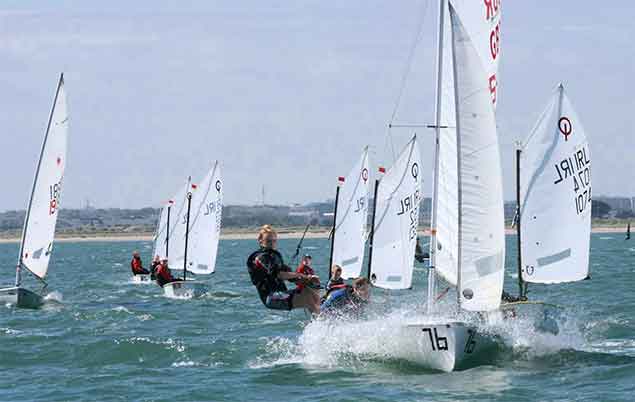 Mixed dinghies race under a Portsmouth Yardstick rule
Mixed dinghies race under a Portsmouth Yardstick rule
Endorsed by ICRA and the Irish Sailing Association (ISA), the system currently preferred by more than 7000 boats worldwide including most Irish and British yachts is the RORC's 'IRC Rating.' Closely monitored by yacht designers and engineer-types, it is essentially a formula that uses various boat measurements to calculate a rating number. When each rating is applied to every boat in a race and all other factors being equal, the factor-adjusted elapsed time should have every boat finish equal, or so the concept should work. And it does, for the most part. The theory and practice would be that those crews who best optimise their performance during the race, will win.
But as the designers get smarter and yesterday's yacht tumbles in value (unlike racehorse ownership, this is not a speculative investor's arena), the rule-masters in the RORC have to stay alert and agile to keep pace and keep relevant for their broad range of customers. However, they will always be 'followers', at best reacting a-season-too-late to those design enhancements that would otherwise render older racing designs obsolete much faster than their owners would stand for.
One-design sailors tend not to understand the attraction and complexity of IRC racing, by preferring to gravitate towards a class that offers localised 'critical mass' that might promise solid investment in relative terms and suggest many years sailing in a vibrant and competitive class. Which is all fine and dandy, but the leading edge of design development will more often be tested and refined in 'mixed-design' racing. Designers such as Mills and Corby revel in the challenge of one-off racing yachts, while the production-line manufacturers like Jeanneau and X-Yachts have to stay sharp with their designs, because producing anything less than competitively-rated racing boats from a production line would be calamitous.
So buying a well-rated IRC cruiser-racer is a bit like committing to the latest gadget, it will be out-performed in no time by the next best thing, albeit with some notable exceptions. What then for the enthusiastic racing owner of an older or lesser-rated design? Giving 5 minutes per hour to boats that frequently cross the line ahead of them will wear the enthusiasm for the sport from owner and crew in no time. There is a safety net and it is in the form of the next layer of complexity in cruiser-racing: Performance-Rated Handicapping.
Built under the guidance of the then ISA President Paddy O’Neill, ECHO (East Coast Handicap Organisation) was created by a team of Irish amateur sailors including Ernest Gouding, Hal Silk, Billy Lacy, Chris Bruen, Arthur Barker, John Deane and Chick Brown who all brilliantly blended their interest in sailing with their maths skills. The system has grown to be the main performance-based cruiser racing handicap system in Ireland and has in recent years been adopted and adapted internationally alongside measurement rating systems such as IRC and ORC.
With help from the Dublin Bay Sailing Club’s Brian Barry, it was integrated into a unique database-structured sailing results system built by Colin McMullen for DBSC and Howth Yacht Club. Colin had the distinction of being the only professional computer programmer in the world who was a sailor. ECHO, which was known in certain circles as as ‘Earnest, Chris Hal and Others’, is best compared to handicapping in horseracing, but by adjusting the elapsed time instead of saddlebag weight.
Calculated by and based on previous performance history, the formula calculates a rating for every boat that should have all boats finish on equal time. Whilst this desired end-point is similar to that of the measurement-based rating, it has a very different rationale. ECHO is designed to reward crews that out-perform their recent average results. The theory being that any boat can win, relative to their own performance history. The actual specification and design of boats is irrelevant and in theory, the slower and obsolete designs now have every chance of winning under ECHO. The ‘lower end’ of the fleet have something to race for, encouraging crew on the lesser competitive boats, eliminating the ‘what's the point’ factor, whilst maintaining and encouraging participation. Everyone's a winner, well perhaps not quite...
For ECHO to work optimally as per the concept, it relies on 'consistency' and all the possible variables need to be removed, or minimised at worst.
• The same boats and same number of boats must be continually racing against each other in each race. Every deviation in numbers competing and/or infrequent entries will alter all boats handicaps accordingly. This makes it at best very difficult, but normally impossible to assign initial handicaps to a mixed fleet of boats that haven’t recently nor regularly raced together. In these circumstances a ‘link’ boat is used where there is found to be a record of it racing against the other boats before, but it rarely works, because ECHO works best with local fleets.
• ECHO's focus is on the relative difference in performance of a boat (particularly the crew), so a change in personnel will often alter performance and therefore another variable is introduced. It should be noted that there is an obligation on boats racing under ECHO to declare substantive changes to crew, but in practice, most changes go 'under the radar' and rarely get declared.
• Any variation from the average/normal in weather conditions will affect the mean calculations. For example, lighter than average winds might favour the lighter displacement boats.
• Any alteration in the type of course (from the average) will introduce another variable. Different boat designs will vary in performance on specific up wind, downwind and reaching legs.
• There is also the issue of 'sandbagging' or deliberately underperforming in order to reduce ECHO rating and use this in the next or later race to advantage. This is very difficult to prove in competitive fleets, because a boat can lose places very easily and in genuine circumstances.
The ECHO administrators allow direct manual intervention to address anomalies such as these, but a results system that affords interpretive adjustments could be seen to be subjective and potentially ambiguous. Single race regattas are the most problematic, where new boats are added without previous integration in that fleet. Interestingly, it seems to work in the potentially controversial sport of horse racing without complaint.
ECHO is often erroneously compared to a golf handicap, but has little in common other than being performance-related. Golf handicaps are not derived from team performance, it is one person versus the course and the other competitors have neither influence on nor an ability to intentionally affect an opponent's score. Golf is not a race. Performance-rated yacht racing is almost always a team-sport, where with certain probability, every race will mean a change in performance by at least one boat, necessitating handicap revisions to all.
The step towards ‘progressive’ maintenance of ECHO handicaps was a welcome one for racing sailors that embrace the performance handicap, because it readjusts after every race. (ECHO used to only adjust periodically, often causing consternation in fleets by huge changes happening at one time.) However, as a consequence of this, it is almost impossible for an experienced and ECHO–savvy competitor to determine their actual standing during a race – what must it be like for the newbie or spectator? Whatever the difficulty with deducing the standings during an IRC race, performance handicap races are absolutely not spectator events.
But to be stressed out about the accuracies and anomalies of this system is futile. It will raise the passions of many a sailor, particularly when a calculation seems to produce an unfair result. Like measurement ratings, ECHO handicapping is not a pure science, but with the probability of so many variables, sailors need to know that it is always imperfect.
With the development of relatively simple sailing results software and the adoption of ECHO-type systems by sailing clubs and classes across the world, it is now possible to use this software for most sailing events and club racing. Lots of one-design classes have effortlessly added performance handicap prizes to their traditional ‘scratch’ races and events. Club volunteers who are using software packages such as Sail 100, SailWave and Top Yacht can now set up performance handicapping for dinghies, one-design keelboats and for cruiser racing in addition to providing results for Scratch, PY and IRC. This is now an attractive proposition for many clubs, because performance handicapping works best for local fleets where the same boats and sailors race together frequently.
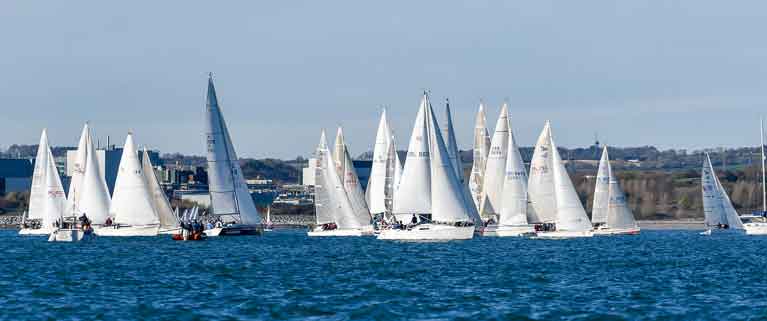 A wide range of different cruiser and sportboat types combine for all-in club racing. Photo: Bob Bateman
A wide range of different cruiser and sportboat types combine for all-in club racing. Photo: Bob Bateman
So how might this affect the future for ECHO in Ireland? The ‘elephant in the room’ and big consideration for the ISA and ICRA is that ECHO-type software programmes are now freely available and ideal for local club racing. Why then might a regional club or class need to use or pay for ECHO? It will naturally be conditional that the major regattas such as Volvo Dun Laoghaire and the ICRA Nationals insist on IRC and ECHO affiliation, but what for the local regattas when dinghies, powerboats and all sorts can use this software freely?
The current handicap registration process for cruiser racers in Ireland sees ICRA ‘pass the ball’ to the Irish Sailing Association to oversee the administration of IRC, ECHO and consequently the management of ICRA membership. With over 450 registered ‘member’ boats, ICRA really needs to take control of its own destiny. Their funding comes from an agreement with the ISA, who return a ‘slice’ of the revenues collected for racing certs (IRC and ECHO), after an administrative fee is deducted. A recent straw poll of the racing classes in Ireland would suggest that the average annual subscription for the various keelboat classes wanders between €50 and €100. One might imagine that a class that boasts about having thousands of participants should at the very least be able to raise €50-€100,000 of its own funds each year. But if there is danger in tagging their subscriptions through the ISA to an ECHO system that could now freely transfer to clubs and classes, and an IRC certification system that is already wary of international trends and new local interest towards ORC, then it’s time to think more creatively.
How might ICRA capture all cruiser-racing boats and add value where the ‘what’s-the-pointers’ need to be encouraged to participate in a national racing organisation? For instance, it’s possible that moves towards the national licensing and registering of vessels could provide an opportunistic inlet, although it would mean that the ISA would need to partly relinquish what would be its national governance – perhaps unlikely.
Taking control of a database-built results system might also afford ICRA (and other classes) to take responsibility for their members and racing administration – it would certainly help with sharing of performance handicap data and add value for clubs, classes and sailors. However, it has been suggested that the set-up cost would be prohibitive.
To survive as an organisation, ICRA must be an organisation – taking control of its own finances and of its own management of the Association.
The ICRA National Conference is being held in Castletroy, Limerick on Saturday and is themed ‘We must talk about cruiser racing’ and it’s certain that there will be lots of lively talk.
Brian Turvey
ICRA’s 'Boat Of The Year'? You Choose
The Annual Conference of the Irish Cruiser Racer Association (ICRA), an absorbing all-day affair in Limerick this Saturday (March 4th), has an intriguing agenda writes W M Nixon. But for many sailors from all over Ireland and the other side of the Irish Sea, the high point of it all will be the announcement of the ICRA “Boat of the Year” selected by the ICRA judges.
We revive memories of the great year of 2016 by running our own informal poll - just click as you wish on this alphabetic list at the bottom of this story to see whose achievements rise up the ranking. We can only say that that the wealth of choice speaks highly of the great good health and re-growing popularity of “waterborne truck racing”
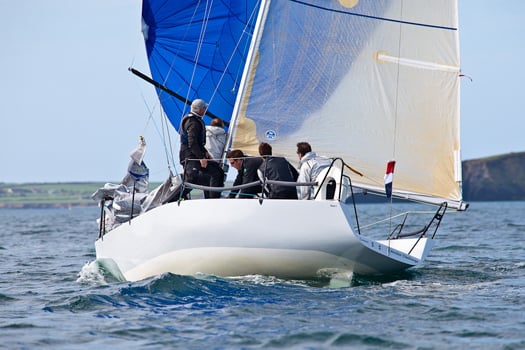 QUARTER TONNER Anchor Challenge – Paul Gibbons from Royal Cork Yacht Club. Photo: Bob Bateman
QUARTER TONNER Anchor Challenge – Paul Gibbons from Royal Cork Yacht Club. Photo: Bob Bateman
Anchor Challenge: Paul Gibbon’s classic Quarter Tonner from Crosshaven was good on enthusiasm, and good on performance, her top line being the overall win in the IRC Europeans at Crosshaven in July, which he plans to defend at Marseilles this summer.
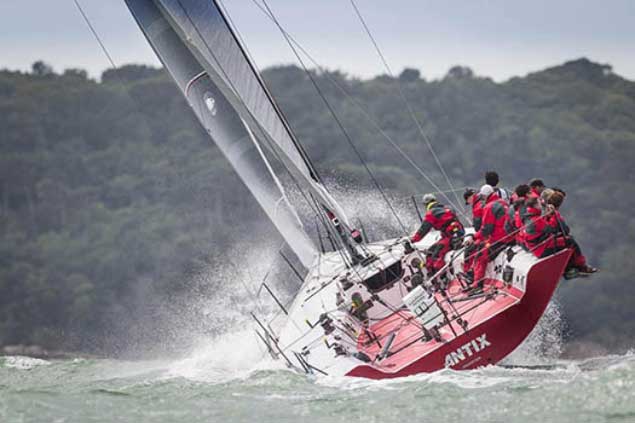 KER39 Antix – Anthony O'Leary from Royal Cork Yacht Club. Photo: Paul Wyeth
KER39 Antix – Anthony O'Leary from Royal Cork Yacht Club. Photo: Paul Wyeth
Antix: Anthony O’Leary’s Fast Forty+ may not have had her most successful season ever in 2016, but many crews would give their eye teeth to have a record as good, topped with the Class O win in the IRC Europeans in Cork Harbour in July.
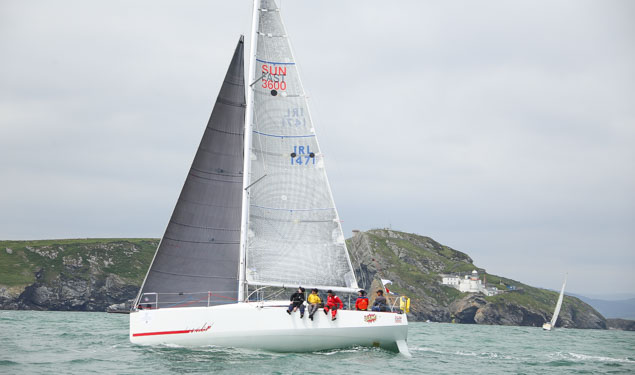 SUNFAST 3600 BAM! - Conor Fogerty from Howth Yacht Club. Photo: Afloat.ie
SUNFAST 3600 BAM! - Conor Fogerty from Howth Yacht Club. Photo: Afloat.ie
Bam!: With the complexities of the RORC Caribbean 2017 still fresh upon us, we realize just how good was Conor Fogerty’s Class win in 2016 in this demanding maze of a race around the islands with his Sunfast 3600 Bam!. And on top of that, it was all just part of an extraordinary season with thousands and thousands of miles of sailing and racing
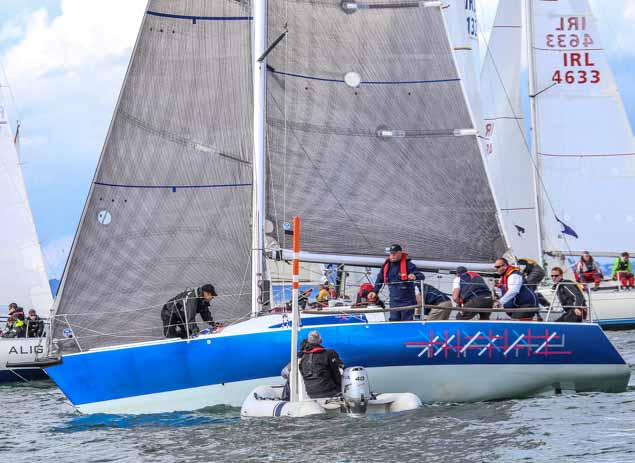 HALF TONNER Checkmate XV – David Cullen from Howth Yacht Club. Photo: Afloat.ie
HALF TONNER Checkmate XV – David Cullen from Howth Yacht Club. Photo: Afloat.ie
Checkmate XV: David Cullen’s beautifully-presented classic Half Tonner Checkmate XV found form to rocket to the top in the ICRA Nats at his home port of Howth in June in a very convincing style. Dave also skippered the J/109 Storm to a class win in the Volvo Round Ireland as Euro Carparks, but maybe that should count as a success for the Kelly family’s Storm, which also won the J/109 Nationals
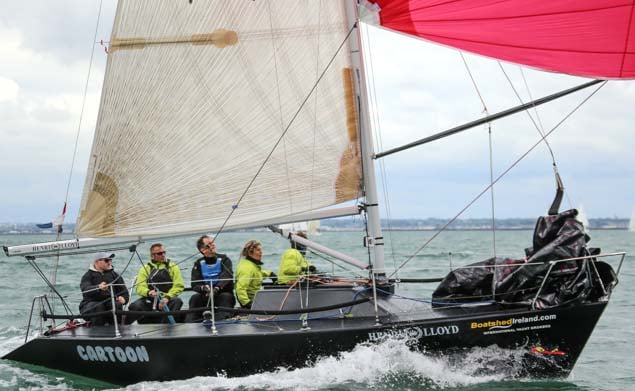 QUARTER TONNER Cartoon – Ken Lawless & Sybil McCormack from the Royal Irish Yacht Club. Photo: Afloat.ie
QUARTER TONNER Cartoon – Ken Lawless & Sybil McCormack from the Royal Irish Yacht Club. Photo: Afloat.ie
Cartoon V: Ken Lawless & Sybil McCormack (RIYC) with their characterful Quarter Tonner came sweeping through the IRC Nationals to win their class in style.
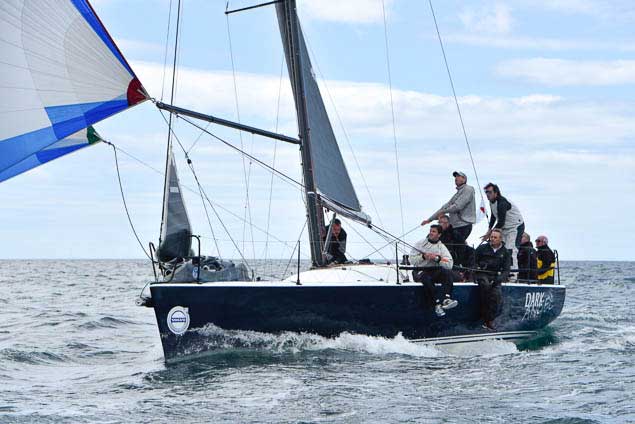 DUBOIS 37 Dark Angel – Tony Ackland from Swansea. Photo: Bob Bateman
DUBOIS 37 Dark Angel – Tony Ackland from Swansea. Photo: Bob Bateman
Dark Angel: Tony Ackland from Swansea turned all heads with his handsome boat which in a previous life was well known in both Cork Harbour and Galway. There’s more than just looks to the Angel – she won IRC 1 in the Europeans at Crosshaven.
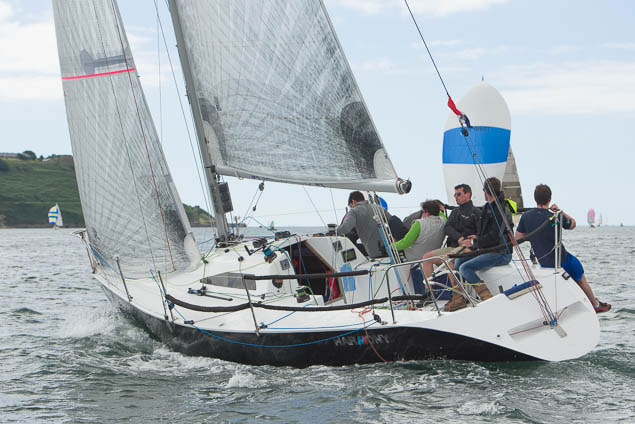 HALF TONNER Harmony – Jonny Swan from Howth Yacht Club. Photo: Bob Bateman
HALF TONNER Harmony – Jonny Swan from Howth Yacht Club. Photo: Bob Bateman
Harmony: Jonny Swan’s wooden-built classic Half Tonner Harmony benefitted from an under-deck laminated fore-and-aft girder installed by Dougal McMahon of Belmont in County Offaly literally to provide a bit of backbone, and it worked a treat. In many victories, Harmony won IRC 3 in the Europeans at Cork.
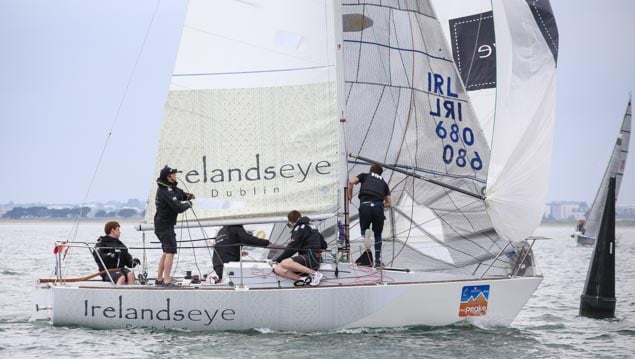 J24 Ireland's Eye Kilcullen – HYC under-25s from Howth Yacht Club
J24 Ireland's Eye Kilcullen – HYC under-25s from Howth Yacht Club
Ireland’s Eye Kilcullen: The HYC nippers – aka the under-25s – in the club-backed J/24 showed there’s still life in this classic Johnstone design. In open events they took second place in Class 4 at Cork Week and the IRC Europeans, they also took third overall in the J/24 Under 25 Europeans. And in the class in Ireland they won the Nationals (7 wins in 7 races), the Northerns, the Southerns, and the Westerns.
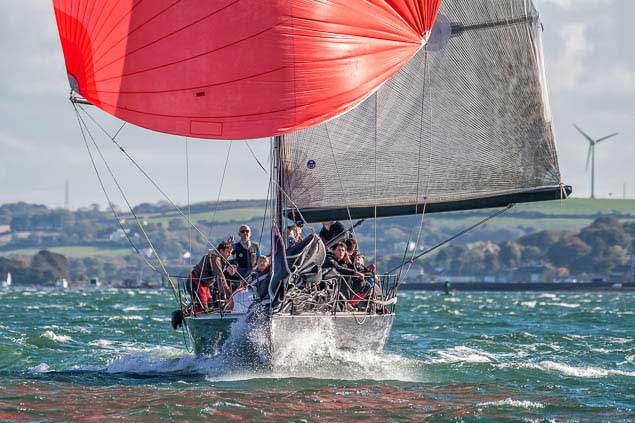 KER36 Jump Juice - Conor Phelan from Royal Cork Yacht Club. Photo: Bob Bateman
KER36 Jump Juice - Conor Phelan from Royal Cork Yacht Club. Photo: Bob Bateman
Jump Juice: Like good wine, Conor Phelan’s Ker 36 from Cork improves with age. They won the RORC Easter Challenge in ferocious weather in the Solent overall, and they won Class O in convincing style at the ICRA Nats in June.
 J109 Joker 2 - John Maybury from the Royal Irish Yacht Club. Photo: Afloat.ie
J109 Joker 2 - John Maybury from the Royal Irish Yacht Club. Photo: Afloat.ie
Joker 2: If you wanted a demonstration of the J/109’s all round ability, John Maybury’s Joker 2 provided it in 2016. She recorded a back-to-back win in the ICRA Nats – the only boat to do so in 2015-2016 – and under the skippering of Commandant Barry Byrne, she was the first winner of the new inter-forces Beaufort Cup including winning its Fastnet Race. Same boat, but completely different crews – Joker 2 makes a special claim for top boat of the year
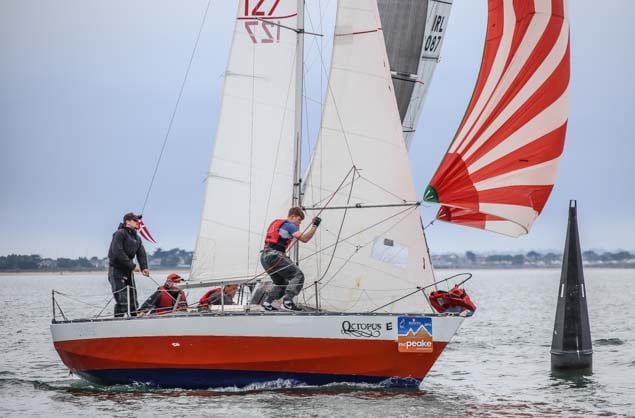 E–BOAT OctopussE - Pat O’Neill from Clontarf Yacht & Boat Club. Photo: Afloat.ie
E–BOAT OctopussE - Pat O’Neill from Clontarf Yacht & Boat Club. Photo: Afloat.ie
OctopussE: The Julian Everitt-designed E Boat is a blast from the past, a miniature offshore racer in which the vertical keel can be retracted completely into the hull. The fleet at Clontarf deserve every credit for their multiple use, including club racing and canal cruising. But it is Pat O’Neill who carries it all through with competition in the ICRA Nats, and he won IRC 4.
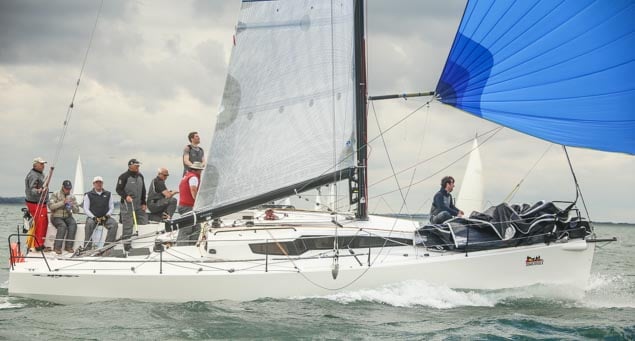 JPK 10.80 Rockabill – Paul O'Higgins from the Royal Irish Yacht Club. Photo: Afloat.ie
JPK 10.80 Rockabill – Paul O'Higgins from the Royal Irish Yacht Club. Photo: Afloat.ie
Rockabill VI: It takes courage to start racing in a boat with a massive international success record like the JPK 10.80, but Paul O’Higgins was game for the challenge when he took Rockabill VI fresh out of the wrappings to do the Volvo Round Ireland Race in June, and came within an ace of a class win. He then re-surfaced for the IRC Europeans at Cork in July – and won IRC 2.
- Votes: (0%)
- Votes: (0%)
- Votes: (0%)
- Votes: (0%)
- Votes: (0%)
- Votes: (0%)
- Votes: (0%)
- Votes: (0%)
- Votes: (0%)
- Votes: (0%)
- Votes: (0%)
- Votes: (0%)


| Total Votes: | |
| First Vote: | |
| Last Vote: |


























